In Kenneth Leung’s own words, 2020 was “a bad year for many people.” For Leung himself, it saw the end of his eight-year stint as a Hong Kong legislator.
The 58-year-old, who had represented the accountancy constituency since 2012, was ousted from the Legislative Council (LegCo) in mid-November alongside three fellow democrats following a decision by Beijing allowing the government to unseat lawmakers deemed to be “unpatriotic.”
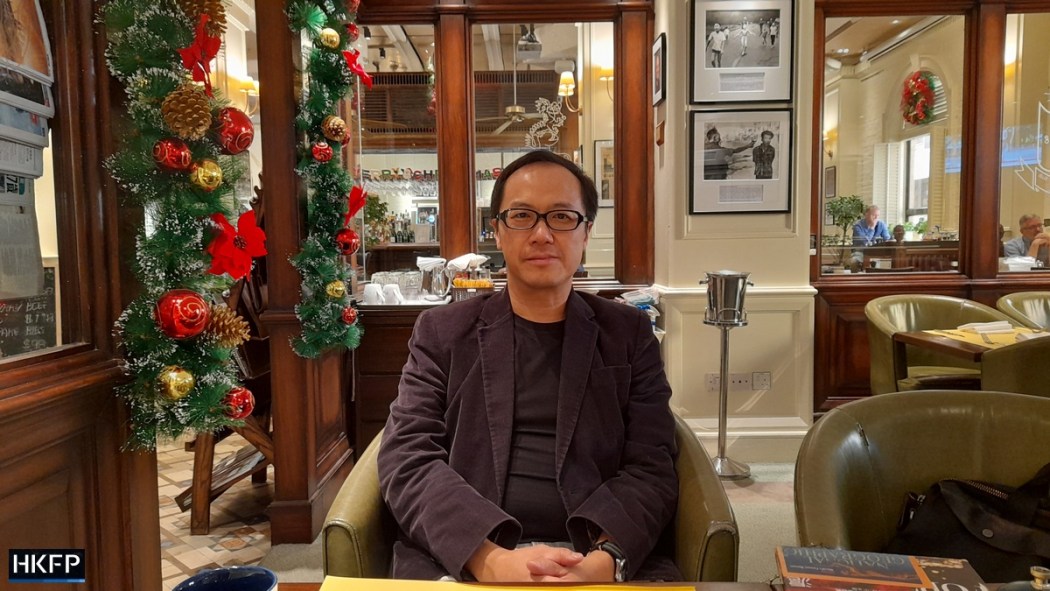
Speaking with HKFP about life after his sudden disqualification, Leung — a chartered accountant and lawyer — said he was undeterred and settling back into his private practice.
“Of course, in the first few days it was quite a shock,” he said. “Life is getting back to normal… I’m gradually getting back to professional work.”
The former lawmaker said he had entered politics to bring about meaningful change and what he enjoyed most was the scrupulous work of vetting bills. “I wanted to effect policy changes… I wanted our bills to be of a high standard, to be beneficial to Hong Kong.”
He reflected on bills he was proud to have chaired during his eight-year term: the city’s first paternity leave bill and the ivory trade bill. The government undertook to phase out the lucrative trade in elephant tusks in May 2018, with a view to ban commercial possession of ivory by December 2021.
The accountant also served eight years on the Public Accounts Committee, monitoring the government’s spending. He vowed to continue keeping a close eye on expenditure by Lam’s administration.

“Public policy is my favourite arena,” Leung told HKFP. “In the long run… I will still be very interested in looking at how the public finances of this government are doing. I will be closely watching the Lantau Tomorrow project,” he said, referring to the HK$624 billion the government plans to spend building an artificial island for housing and business.
Leung said he had no plans to disappear from the public sphere. “I still have a platform. I still do a lot of advocacy, although my main area will be back to normal practice. I’ve been following these issues for many years so it’s not that difficult for me to speak out if I see a problem there.”
He however clarified that he would avoid politically sensitive issues, and instead focus on the details of government policies. “I’m stepping back, in a sense. The most part of my time will be spent on my private practice. But it’s very difficult for me to just cut off 100 per cent from public policy area… I will not touch too much on political issues.”
Reflecting on his years as an opposition lawmaker, Leung said he had fond memories. “On a whole, I did enjoy the eight years, although there were a lot of thorny political issues.”
Confidence crisis
Leung’s tenure at LegCo coincided with Hong Kong’s worst political crisis in recent memory: the city-wide unrest of the 2019 pro-democracy protests and, subsequently, the most controversial law to be enforced on the city — the national security law.
Reflecting on the key changes in the city’s governance within the past year, Leung said 2020 marked two significant shifts. “The biggest watershed, of course, is the national security law, a law… imposed by the National People’s Congress,” he said.
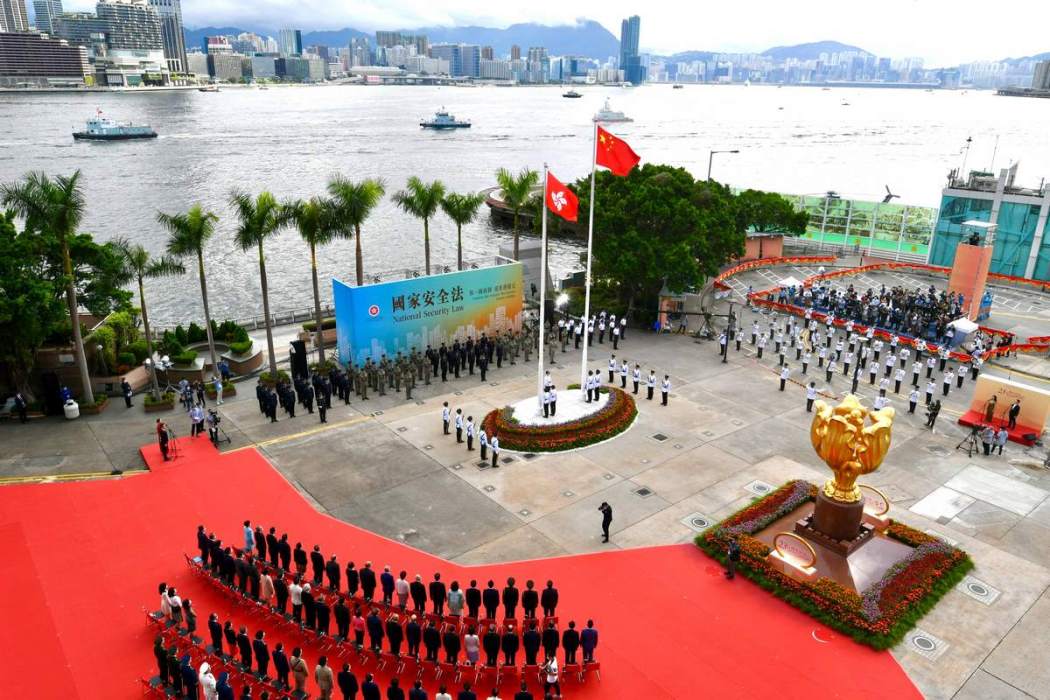
The law was promulgated on June 30 by Beijing, bypassing Hong Kong’s own legislature –contrary to the provisions of the Basic Law, the city’s mini-constitution. The law, which bans the undefined crimes of secession, sedition, collusion with foreign forces and terrorism, has been criticised by rights groups and foreign governments as a tool to systematically crack down on dissent.
“The second big shock, of course, is the disqualifications,” he said. The ousting of Leung and his three colleagues closely followed a decision by China’s top legislative body allowing the government to immediately unseat lawmakers deemed to be in violation of their oaths of allegiance under the Basic Law, bypassing the city’s courts.
“We haven’t seen this happen before. In the past, we had interpretations of provisions of the Basic Law… The National People’s Congress decisions are really something they can do at their own pace [and] discretion.” he added. “They should follow the provisions and mechanisms in the Basic Law but they haven’t for these two cases, regrettably.”
This, as he sees it, has created “a very big confidence crisis” in the integrity of the original political arrangement between the local government and Beijing. “It’s not conducive to One Country, Two Systems.”

For Leung, the way to combat this crisis is to cleave to the values of transparency and rationality which underpin the rule of law. “The [national security law] is a fait accompli, we cannot change much. So we have to work within the framework and urge the central government to be more rational and to have a more long-term vision for Hong Kong.”
To remedy the confidence crisis, Leung said the security law could be tamed if it can be brought within the ambit of Hong Kong’s own common law system.
“A lot of grey areas in the national security law need to be clarified. There are some provisions that are so overwhelming and draconian… I can’t envisage how the authorities will enforce them,” he said. “So I would very much hope the National People’s Congress, in due course, can revise some of these clauses so that this piece of legislation can fit in… better within the Common Law framework.
He added that the law should only be used for genuine threats to national security, instead of as a tool for political oppression. “In terms of enforcement… the Hong Kong government should be wise enough in the long term to only concentrate upon the [real] national security law cases, not just using it as an instrument for persecuting any political, anti-government [sentiment].”
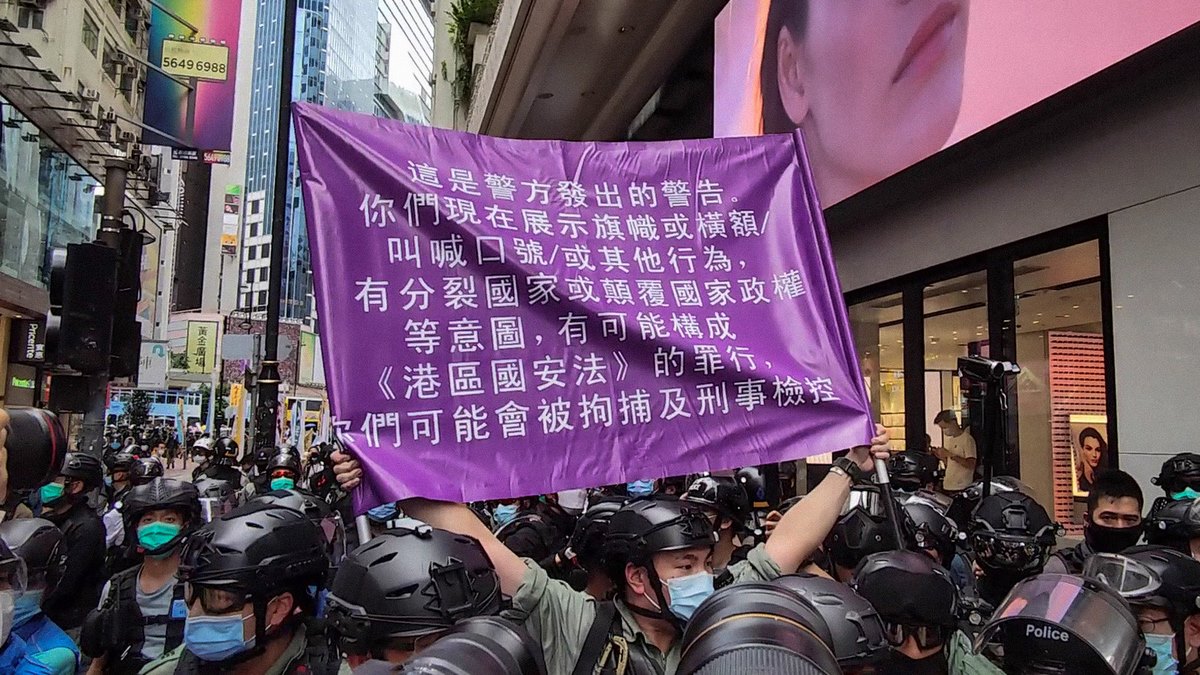
Since July, pro-democracy figures including 19-year-old activist Tony Chung and Apple Daily founder Jimmy Lai have been charged under the security law.
Leung said Beijing should refrain from such politically-motivated moves. “The system is under the mercy of the Chinese Government. But if they have vision, if they really want Hong Kong to be a useful place… they should come up with better policies,” he continued. “If, in the long run, we can see that the national security law is enforced in a more rational and transparent way… in the long term, confidence can come back.”
He cautioned, however, that confidence was not easily restored. “We’re not talking about [in] a year or two, it would be take a bit of time.”
No regrets
A month after Beijing enforced the security law on Hong Kong, Leung and three of his fellow opposition lawmakers — Alvin Yeung, Kwok Ka-ki and Dennis Kwok — and eight other election hopefuls were disqualified from running for re-election in the Legislative Council races originally set for September.
The elections were later postponed until September 2021, with Chief Executive Carrie Lam citing pandemic concerns. Leung, along with the majority of the democrats, decided to stay on in the extended term. But it was short-lived. Just six weeks later, the four were abruptly ousted from their seats and the rest of the opposition camp resigned in solidarity.

“The road to democracy is especially long when confronting an authoritarian regime. But we will not be defeated by pressure and oppression. We will find a new way,” said the Democratic Party chair at the time, Wu Chi-wai. The move left the legislature with no effective opposition and raised concerns amongst rights groups that it would become a mere rubber stamp.
Leung was barred from running for re-election after he travelled to the US in March on a bipartisan trip. During his visit, he discussed with US officials the possibility of imposing sanctions on Hong Kong. Among the reasons given by the returning officer for Leung’s disqualification were that, although he had not directly called for sanctions, he had played a “supportive” role.
Little over a month after the security law came into force, the US sanctioned eleven Hong Kong officials — including the city’s leader Carrie Lam — for their roles in the implementation of the security law. The US State Department cited a serious curtailment of Hong Kong’s promised freedoms and autonomy. The Trump administration shortly afterwards ended Hong Kong’s special trading status.
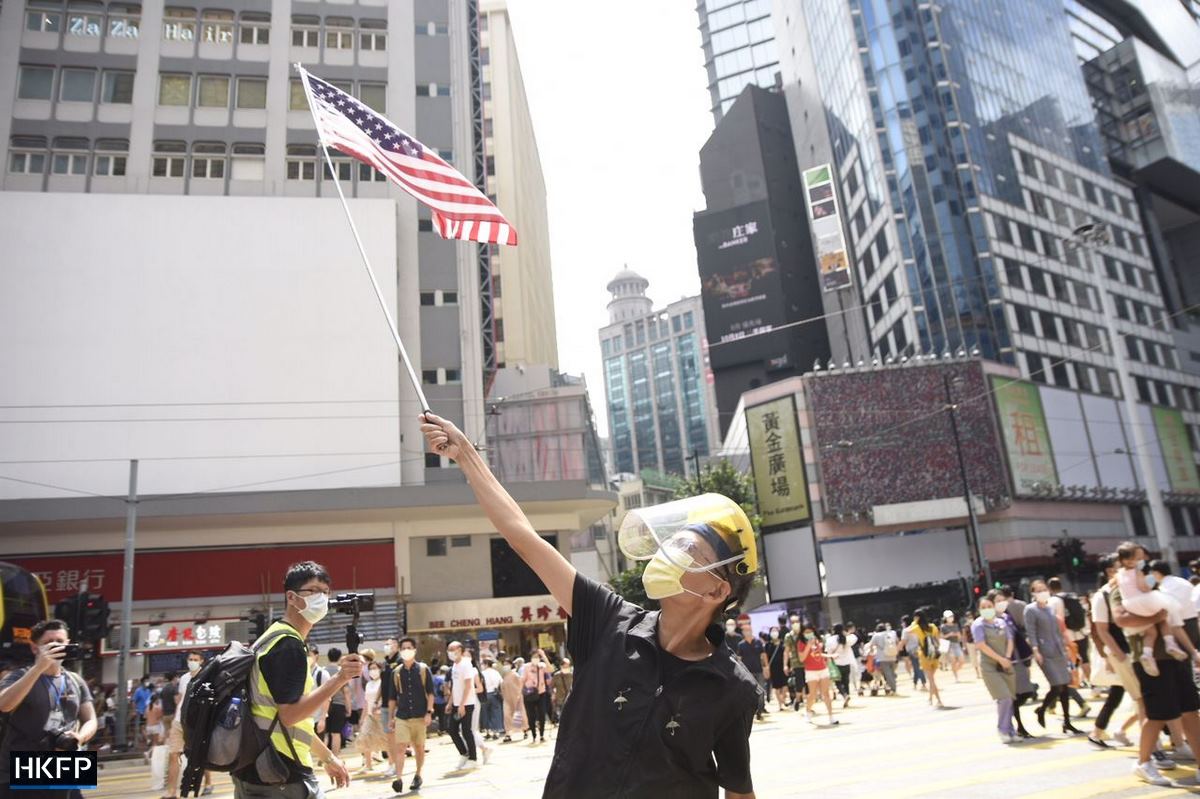
Speaking about the events which foreshadowed his subsequent ousting from LegCo, Leung said he had no regrets. “I don’t have any regret visiting the States,” he told HKFP. “The purpose of the trip… was to find out how sanctions actually work for Hong Kong.”
Leung said he didn’t agree with the US imposing sanctions on Hong Kong. “I didn’t ask for any sanctions… [they are] not productive in the long-run. If you look at sanctions applied to other countries in the past, really, it would be the people of the city or country… who, in the long run, will suffer.”
‘Dual role’
Instead, as a finance professional, Leung said it was important to preserve confidence in Hong Kong’s governing systems so the city could maintain its position as an international financial centre. It’s important that “Hong Kong still remains an important financial hub in Asia,” he said.
He added that he hoped the city can continue as a frontier between the West and Beijing. “Hong Kong has a role to play because it is a buffer zone between the West and China, traditionally. Let’s keep it that way.”

Otherwise, Leung said, Hong Kong will lose its international appeal. “If not, then we are just going back to being back to one country – just a normal Chinese city with not much characteristics or significance… I’m sure people who have been living here for a long time would not want to see Hong Kong become just a very normal Chinese city.”
When asked what this would mean for Hong Kong’s financial sector, Leung said its global role would be diminished. “We’d be doing business with the Greater Bay Area, but without much international business. We would be a financial centre for the Greater Bay Area.”
In Lam’s policy address delivered in November, she introduced policies geared towards integrating Hong Kong economically into the Greater Bay Area. Leung said this should not detract from Hong Kong’s international role. “I don’t see why integrating into the Greater Bay Area will stop Hong Kong from being an international finance centre. We can have a dual role,” he said. “It’s important for Hong Kong to have a dual role.”
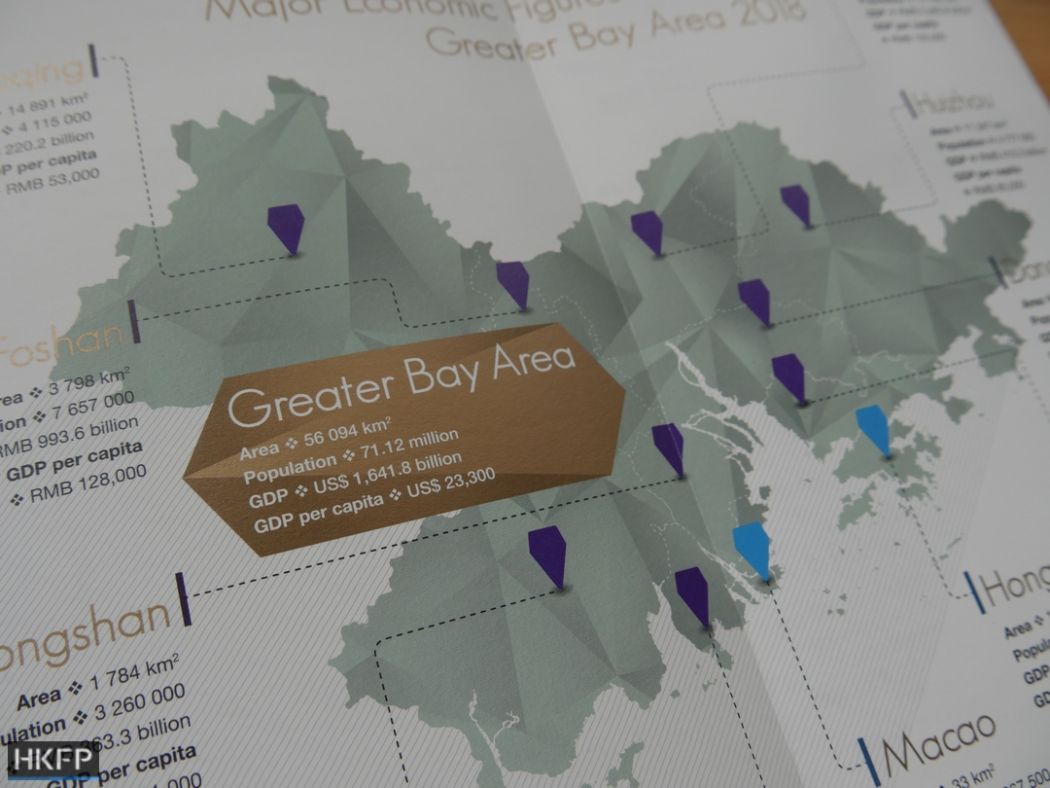
“We have to be open and more outward-looking. Apart from having a role in the Greater Bay Area, we have to have a role internationally, that is extremely important for Hong Kong,” he added.
Leung also criticised Lam’s overall policy address as offering “piecemeal measures” which fail to address the wider issues of the city. “She needs to have a bigger vision for Hong Kong. She needs to mend the rift between the different polarised sectors in society.”
2021?
Looking forward into the coming year, Leung described what he saw as Hong Kong’s best case scenario. “We’re done with Covid-19. We have the elections. There is a fair number of opposition members in the legislature. Policing power is being constrained,” he said.
“In the long run I would like to see the police complaint system being overhauled. I would like to see more training on, not just the tactical side, [but] ethics, all kinds of core values about the police, there should be a fresh training programme.”

“I would like to see the judiciary operating with professionalism and integrity,” he continued. “I would like to see the judicial secretary far more upcoming in preserving the independence of the judiciary. I would also like to see more sensible and prosecuting policies.”
He referred to protest-related cases pursued by the Department of Justice this past year which the courts themselves considered to be tenuous. “In some of them, there was no case to answer. There was a waste of resources… Did the judicial secretary firmly believe that there is a chance of success?” Leung asked.
“But the worst case scenario, of course, there’s no [LegCo] election next year, the pandemic continues, the economy is still sluggish, and the reserves are draining away, unemployment rate shot up, China and the US still locking horns,” he speculated.
Leung also noted that many Hongkongers from different sectors were already leaving the city, describing the situation in the coming year as potentially “quite desperate.”
“The government has already announced that we are not going to have another cash subsidy scheme because they are running out of cash,” the former deputy chairman of the Public Accounts Committee mused. “I would predict that for the next year the budget deficit will be in the region of about HK$400 billion… The following years as well, there will be another deficit, may be smaller — maybe around 200 billion — but easily, all the reserves may drain away.”

Leung considered two elements as crucial to Hong Kong in the coming year. “One will be judicial independence, [that’s] extremely important. The second will be the free flow of information, whether it’s news freedom or freedom of speech.”
He added that despite the security law, there was still scope for people to criticise government policies. “We have these national security law boundaries so people have to be more careful, but we still have a lot of leeway to criticise the government’s policies and I think we should do that,” he said.
‘Don’t give up’
Looking to his own role in Hong Kong’s future, Leung said this year’s setbacks won’t stop him from speaking out. “I do want the best for Hong Kong, and I cannot tell people because of disqualification and I don’t hold a position anymore, and just shut up. I won’t.”
“But I would concentrate more on policy issues and not just say ‘I want sanctions, I don’t want sanctions, I want democracy’ — these kinds of empty slogans. I would like constructive policies, constructive dialogue. That’s the way to run things.”
Asked whether he would join some of his former colleagues and leave the city, Leung said he would stay on to continue to work for a better future. “I will be staying in Hong Kong. I will be trying to do my best for Hong Kong. I hope Hong Kong will still be an international city, a vibrant city, a free city where people would love to go to for visits and business.”
“I’m always very positive about Hong Kong. This positivity is how I survived during my eight years in legislature,” he told HKFP. “I hope Hong Kong Kong people can preserve positivity or optimism, as well. Although at times, there will be setbacks, don’t give up.”
Support HKFP | Policies & Ethics | Error/typo? | Contact Us | Newsletter | Transparency & Annual Report | Apps
Help safeguard press freedom & keep HKFP free for all readers by supporting our team
























